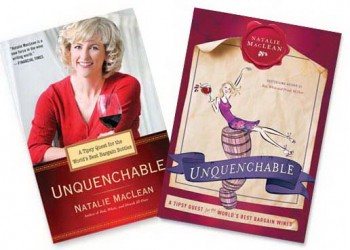Globe-Trotting Page Turner
With an affinity for fine shoes, I’ve developed a keen eye for bargains over the years. When shopping fashion, I’m always on the hunt for the best deal; but when it comes to food and wine, my budget is a bit more lax. I have so much appreciation for the labor and the process it takes to bring these products to the table that I am willing to pay the often-high price; but perhaps I need to review my culinary budget — I’m sure the amount I’ve spent in the past could have flown me to France and back.
Perhaps that’s the reason a well-knowing editor suggested I read Unquenchable: A Tipsy Quest for the World’s Best Bargain Wines, Canadian wine phenomenon Natalie MacLean’s latest book. The lively narrative is a blend of memoir and travelogue, a heartfelt pursuit to discover affordable treasures in unexpected places.
Named the World’s Best Drink Writer at the World Food Media Awards and winner of four James Beard Foundation Journalism Awards, MacLean is also an award-winning sommelier and expert for any food and wine pairing, easily searchable on her dynamic website, www.nataliemaclean.com.
Unquenchable delivers not only with ample food and wine pairings for each wine region visited but also includes creative resources and countless colorful portraits of wine characters, some so enigmatic —see the bowtie clad “Wolfie” Wolf Blass — the personalities deserve their own novel.
The overall intent of the book is to educate and entertain the reader on two main points: (1) Wine does not have to be expensive to taste great; (2) Behind every bottle is a person and a story that make that wine come alive. These are two counts I wholeheartedly embrace.
For many, the allure of wine is how it titillates our primary senses — smell, taste, touch — and story. Engaging us in a way that is both hedonistic and cerebral, two apt words MacLean uses. She references how “rich, layered experiences hold our attention, whether they’re books, paintings or wines.” Our mind is stimulated by complexity.
She then asks: “But who says that only expensive wines can be complex?”
MacLean states early on that one of the missions of the book is to demystify wine pricing in relation to quality. “Some regions have natural advantages that make winemaking inexpensive, whether that’s climate or cheap land and labor,” she writes. Other regions, she explains, are still establishing their reputations and must keep their prices low to be competitive with better-known wines.
From the volcanic vineyards of Sicily to the green slopes of South Africa and many points between, MacLean transports readers into ancient cellars, dusty pickups and out to dinner with winemakers, all the while tasting wines and telling stories.
How is the book different from other wine travelogues? Along the way, MacLean squeezes in diving with sharks, milking goats, predatory hawks and riding polo horses in the mountains. She is a writer with undeniable moxie and spirited prose. As much as I admire her food and wine expertise and accessibility, it is her quirky and honest style that celebrates people and place that truly captivates.
The book is balanced with a splash of practicality, too. At the end of each chapter, MacLean provides takeaways and insider notes about the region with “Field Notes from a Wine Cheapskate.” Inside these chapter wrap-ups, she provides insider tips, wineries visited with web links, best value wines, top value producers, a dinner menu for each day of the week, pairing suggestions, resources and related reading.
While reading the chapter “Vino Under the Volcano,” I yearned for an escape to Sicily — especially during the overcast dreary Oregon winter. Under MacLean’s advice, I would find a local wine shop and buy a bottle of Nero d’Avola and pair with it a recipe from MacLean’s website. Afterward, I would settle in with her book suggestion, “Palmento: A Sicilian Wine Odyssey by Robert Camuto.”
The armchair travel across the globe is certainly a delightful romp, but what lingers most is MacLean’s poetic ability to capture the winemakers’ devotion to their vines.
After peeking a few sections ahead, I knew Provence was the final destination in the book. I also gleaned that she sipped a glass of rosé with the legendary Peter Mayle, and I could not wait to read it.
As much as the worldly travel, wit and wine tips entertained, MacLean and Mayle sipping rosé and passing time in a small village in Provence completely charms. The genteel Mayle leaves the reader with wine’s often-forgotten yet greatest quality: pleasure — not to be tainted with published scores and points.
MacLean asks the writer: Why France? Mayle replies that until you’ve watched a Frenchman enjoying his lunch on a Sunday, you cannot truly understand. “The French are not ashamed to admit to liking pleasure,” he says. “They like to have a good time, and they’re not guilty about it. Let me put it this way: When an American looks at a duck he says, ‘Oh, how cute.’ When a Frenchman looks at a duck, he wonders, ‘How shall I cook him?”
You can read more reviews of my new wine book Unquenchable here.









